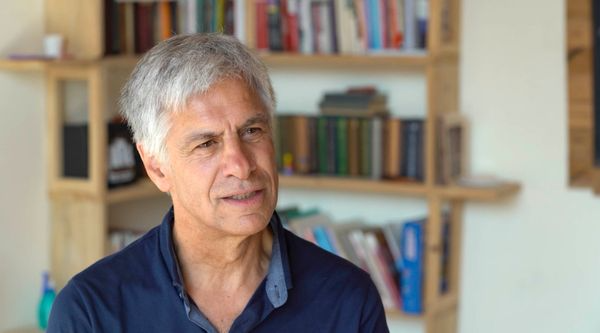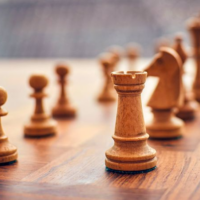At this year’s Youth Society Parzival’s gathering, “Principles of Healthy Social Life”, held in August in Georgia, Gerald Häfner talked to Em Watson and Charles Cross about his experience in working with young people and as a young person himself, and his thoughts around helping humanity mature into its task with the Earth.
Em: What brought you here? Why did it feel it was important for you to come?
The Parzival Youth Initiative that built this house and wants to transform society brought me here! [During the pandemic the Youth Society had stayed active, building a schoolhouse which was the venue for the conference.] They work on these questions, “What can I do? What can we do to make this world a better place?” They asked me to come, probably because of my knowledge and experience in transforming the world in different ways. They invited me three years ago, and I wanted to come, but then there was COVID-19, and the whole world froze. However, it was an important time because that was when they decided to build this environment and this house and to invite young people to gather. I’m one of the oldest here. Mostly, this is young person’s meeting—people at a certain stage in their life where it’s about, “Okay, there are the ideas—what am I going to do out of them? Where is my place in the world?”
Charles: What is it like for you to be around so many young people?
I have to admit that I’m a little bit older now—over 60. For me, this means that I’ve entered a phase in my life where the most important task is not to build the next organization but to share my knowledge and experience and to support and help young people to find their way into life and into society—to do on Earth what they brought from the spiritual world as their task. Usually, we don’t know what that is. We have to find out through our life.
I’m the leader of the Social Science Section at the Goetheanum, which is worldwide work. I mostly work with young people, but in the Goetheanum, there are mostly older people like me. The real work, my real work, is not in the Goetheanum: it’s in Finland, in Brazil, in Belgium—wherever I go, I mostly meet young people who say, “Can we meet? We have this and that idea. We have this initiative. What can we do? Can you help us?” So I’m extremely lucky and grateful to be asked like that and to be serving, to help.
Charles: You have an interesting biography in that your initiative and impulse as a young person led directly to your career as an adult. Still, did you have doubts? Did you feel any pressure to grow up and be realistic? Were you confused about what your path was?
Looking back, my path seems so clear, but it was not clear to me at all in the beginning. It was maybe the most difficult question, and time, of my life. I think I came, just like any young person, to this Earth with the feeling: “It’s not as it should be. It’s completely spoiled. Messed up. They’re going to ruin the world. What can I do?”
I made lists of possible professions. I had artistic skills, so should I become an artist? Should I become a teacher? Should I become a professor at the university? Should I do research? Should I go into politics and so on? It was absolutely unclear to me. I worked as an actor in theater for some time in Italy. I taught in the school. Later, I also taught at university for some time, and so on. I tried different things, trying to find out what my task would be. And honestly, I would say it was not me who found it. It was other people who told me, “Hey, you need to do that.” And, I would say, it was my angel that constantly goes with me, saying, “No, no, no … Maybe. That’s a maybe. Try this one.” So there’s an inner voice, but you only hear this voice when you start getting into action. When you sit there making lists, there’s nothing. I did not come to a solution. But when you experiment, try things, then you constantly have this voice. “Okay, maybe this way. Maybe there,” and so on. If I look back, it’s all clear: it’s one career. But it never felt like that.
I also always did things for a limited time. So when people asked me, for example, to go into Parliament, I said, “You’re crazy.” I was 25 at the time. I thought: I have no experience, I can’t do that. But they were so convinced, that I said, “Okay, I’ll try it, but I’ll only do it for one period, which means four years, and then I’ll leave. I’ll quit because I don’t want to become a professional politician. I don’t want to live a life in politics.” And that’s what I did. After four years, I left and did something completely different, and after four years, I went into Parliament again. So I was in Parliament for four years, out for four years, in for four years, out for five years, in for three years, out for four years, in for five years, and now I’m out again. If I would have done it continuously, I would have become a person that I never wanted to be. I would have changed. When you are in politics, it’s a dangerous world. You are far away from real people and from real life. You live in a bubble. You only meet politicians, journalists, functionaries, and so on. You have to go out of it, cool down, find your real task in life, and then come back. Those who constantly stay in this bubble lose the world and their relation to others and to themselves. That’s dangerous. So, I was guided: “Now, it’s over. Now, you need to get out. Now, you need to get in again.”

Charles: Recently, I’ve been thinking that humanity itself is in an youthful adolescent time period, transitioning between being children of the cosmos into being adults on Earth. Does that resonate with you?
It’s interesting to look at the development of humankind in comparison to a child or to a human being. In the beginning, a child is not really on Earth—it’s constantly sleeping. It’s with the stars, with the angels; it’s up in the skies; sometimes it wakes up and needs some milk or a face to see, but it’s not really encountering. It’s up there. And then slowly it comes onto Earth and starts to stand and walk.
It’s the same with humankind. We started in a wholeness, an all-oneness, where we were not separated, and then we separated. We became individuals more and more. We learned to understand the world and how it works. As a child, you learn in school that it doesn’t thunderstorm because the gods are angry. There is an explanation: there’s electricity in the clouds and so on. It’s the same with humankind; we are now in this observing mood where we challenge our forces. We use the material world. We try to make things out of it. What we need to come to is—I don’t know this word in English: in German, it’s called Mündigkeit [maturity, freely taken responsibility]. So, you have childhood, then you have puberty and adolescence. First, the world is beautiful—it’s all good as it is. Then it’s all wrong—the world is not as it should be. What’s the next step? The next step is to take over responsibility and to understand that the world is as it is because we messed it up. The only possibility is that we change it. It’s in our hands.
But we can only take responsibility if we resonate with the world or with that which we take responsibility for. This resonance, this building of relations, this is what we didn’t learn. Humankind looks at the outside of the world and doesn’t look at the inside, let’s say, of a tree, of a mountain, of a person, of an animal, of a plant. Only when we can relate to the inner being of everything can we really take responsibility. I think that we are at that threshold. If we don’t, if we’re not able to make that next step, we’ll mess it all up. It will end in a catastrophe. But if we can get to the next step, then we can keep all that we learned and use it for serving the planet and all beings and serving our own development in and with the world.
Em: Being inside this movement, going to all these conferences, sometimes I wonder, what are we doing? You always hear, “We want to build something that lasts,” but then it doesn’t. But obviously, something does happen, and you can feel that. From your perspective and your work, do you have a sense of the importance of gatherings like this?
I think the situation of young people is wonderful and difficult and terrible. In conferences like this, there’s the program—and I find it very important to make a good program and to have deep contributions—but the most important thing is that people meet. It’s the time in between. Like in life, the in-between is more important than this or that presentation. There are so many beautiful encounters and conversations. I have had so many meetings with people asking me, “Can we talk with you?” and then telling me, “Okay, I’m at this spot. I’m thinking about a next step, but I don’t know what exactly it is.” Sometimes, it’s just about listening. Sometimes, it’s about asking a question or giving a hint. “Did you think about that?” Sometimes it’s saying, “I know another person who has the same idea; why don’t you do it together?” I would have appreciated that so much. I discovered anthroposophy quite late, and I was alone with all my questions for such a long time. So I’m so happy that events like this are possible, where young people can meet and ask these questions.
The other thing is that anthroposophy is a gift and a danger. The gift is that it can help us to better understand the world, ourselves, and every being. The danger is that it tends to become abstract. There’s such a huge oeuvre: we can read 300 books by Rudolf Steiner, and people get lost in that. They accumulate abstract knowledge. They can tell you everything they read, but they didn’t live it. It’s nothing when we just read things. We only know what we really experience for ourselves. So the books can be a help, and I would recommend that every young person read and study, but real life is not in the books. For an anthroposophist who has read a lot, it’s dangerous because we think we know a lot, but sometimes we don’t find the point in life to start—because we always start from scratch and we will make mistakes. You can’t foresee everything. You can’t do the perfect job. So, where is this power, this will to start, to really grab the soil or the social reality with your hands?
That’s what I’m constantly trying to do, to say to people, “Now you’ve studied enough. Just try that—and I’ll help you if I can—but go into real life. Then you’ll find the real anthroposophy that’s about transforming ourselves—transformation through being part of the universe and being able to do things that you couldn’t do without anthroposophy and that will only happen if you do them.”
More at We Are Becoming













